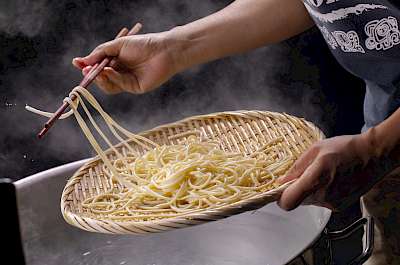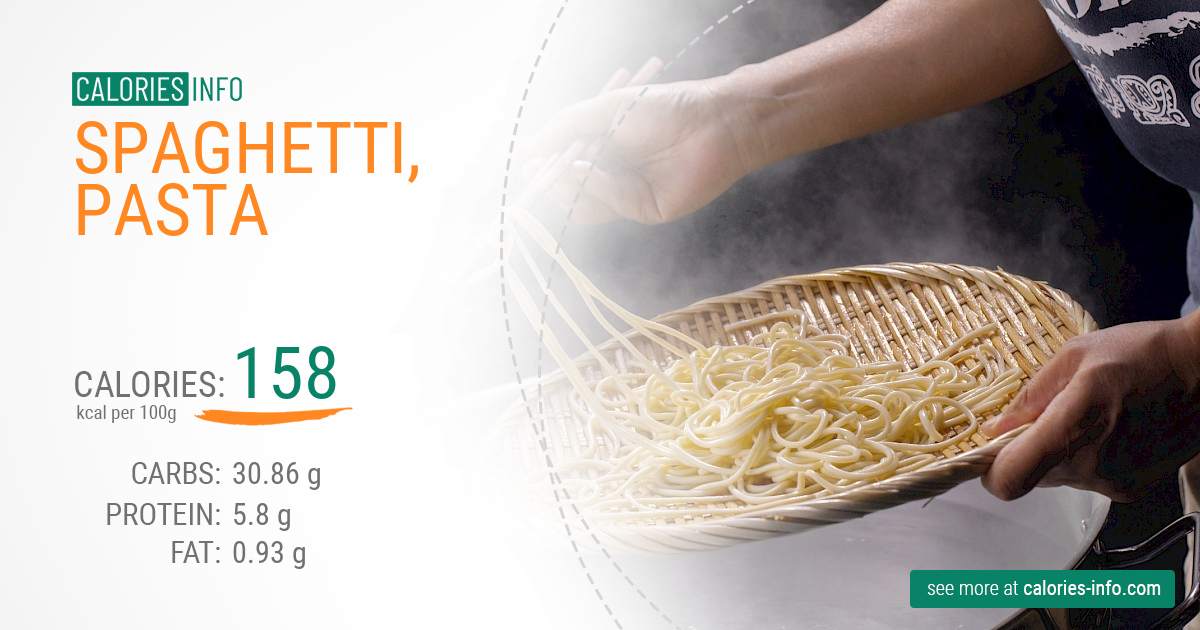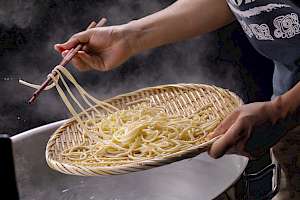Spaghetti, Pasta: Calories and Nutrition Analyse
How many calories in spaghetti?
100g of spaghetti has about 158 calories (kcal).
Calories per:
ounce
| cup
| half cup
It is about 7% of daily calories intake for adult person with medium weight and medium activity (for calculation we assumed 2400 kcal daily intake).

Scroll down for details and nutrition tables.
To visualize how much 158 kcal actually is, take in mind that calories amount from 100g of spaghetti is similar to calories amount from ie.:
- 3 apples
- 2 glasses of Coca Cola (220 ml glass)
- 1.5 slices of cheese
- 1 slice of bread
- 1 glass of milk
- 8 cubes of sugar
Take a look at tables below to see details about spaghetti nutrition.
See all nutrition data of spaghetti on charts.
Calories And Nutrition in 100G of Spaghetti, 100g and Ounce
| per 100 g | per ounce | 100g of spaghetti | |
|---|---|---|---|
| Calories | 158 | 44.79 | 158 |
| Carbs Total | 30.86 g | 8.75 g | 30.9 g |
| Dietary fiber | 1.8 g | 0.51 g | 1.8 g |
| Fat | 0.93 g | 0.26 g | 0.9 g |
| Protein | 5.8 g | 1.64 g | 5.8 g |
| Water | 62.13 g | 17.61 g | 62.1 g |
spaghetti - vitamins per 100g
- Vit B1 (Thiamine)0.02 mg
- Vit B2 (riboflavin)0.02 mg
- Vit B3 (Niacin)0.4 mg
- Vit B60.049 mg
- Vit B9 (Folic acid)0.007 mcg
- Vit E0.06 mg
Energy content of spaghetti
- 80% CARBS
- 15% PROTEIN
- 5% FAT
spaghetti - minerals per 100g
- Potassium44 mg
- Phosphorus7 mg
- Magnessium18 mg
- Calcium7 mg
- Sodium1 mg
- Iron0.5 mg
- Zink7 mg
How many calories in 1, 2, 3 or 5 spaghetti?
As I wrote before 100g of spaghetti has 158 calories. It is easy to count that two spaghetti have about 316 calories and three spaghetti have about 474 calories. In table below you can also see calories amount for four and five spaghetti.
- Cup of spaghetti (110g)174 kcal
- Half cup of spaghetti (55g)87 kcal
- Ounce (oz) of spaghetti45 kcal
- Half of medium size spaghetti79 kcal
- Small size spaghetti (80g)126.4 kcal
- Big size spaghetti (130g)205.4 kcal
- Two medium size spaghetti316 kcal
- Three medium size spaghetti474 kcal
- Four medium size spaghetti632 kcal
- Five medium size spaghetti790 kcal
Protein in spaghetti
Spaghetti has 5.8 g protein per 100g.
Carbs in spaghetti
Spaghetti has 30.86 g carbohydrates per 100g.
Fat in spaghetti
Spaghetti has 0.93 g fat per 100g.

100g of spaghetti has:
158kcalFor burning these calories you have to:Interesting charts - compare spaghetti with other grain products
When you look at charts below you will see how spaghetti looks like in comparsion to other products from its category. When you click on selected product you will se detailed comparsion.
Similar calories number have:
See also:
Read this:
- How many calories does oat milk have?
- Calories in a half of Chimichanga
- Calories in whole Chimichanga
- Calories for one, two or more Chimichanga
- How many carbs (carbohydrates) in Bojangles biscuit?
- How much fat in angel hair pasta?
- How much protein in wasabi peas?
- What is weight of sweetcorn?
- Fruit salad calories per ounce (oz)
- Artichoke salad in oil calories per serving size




Add comment